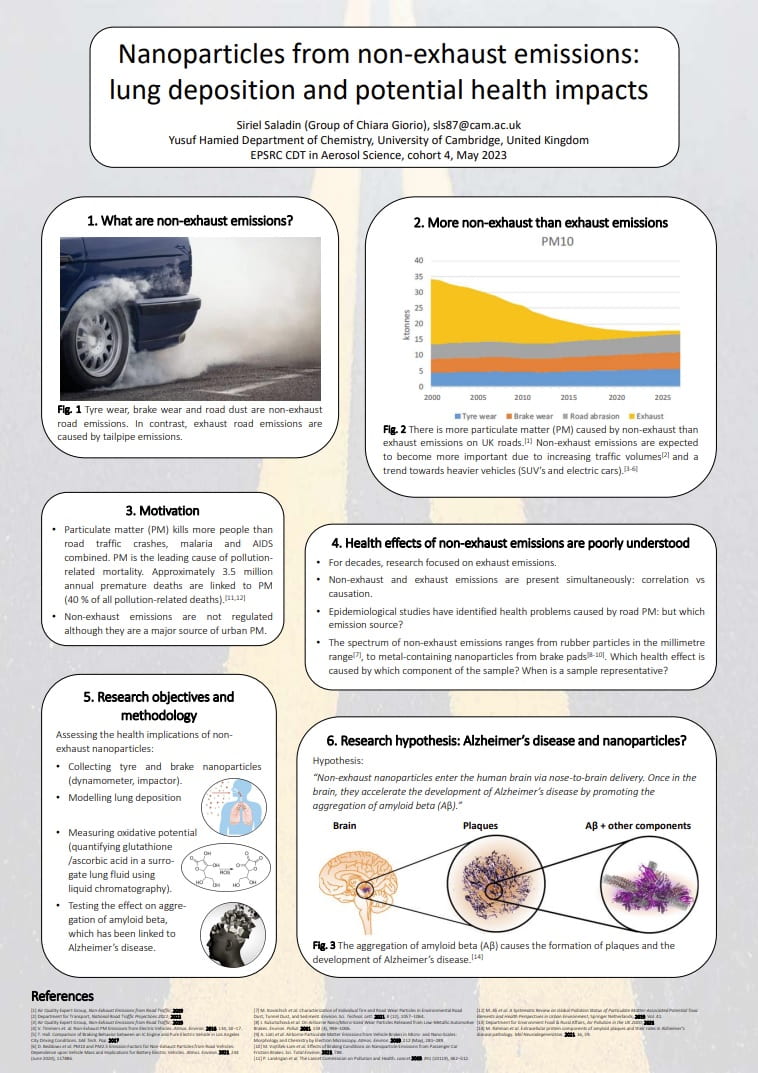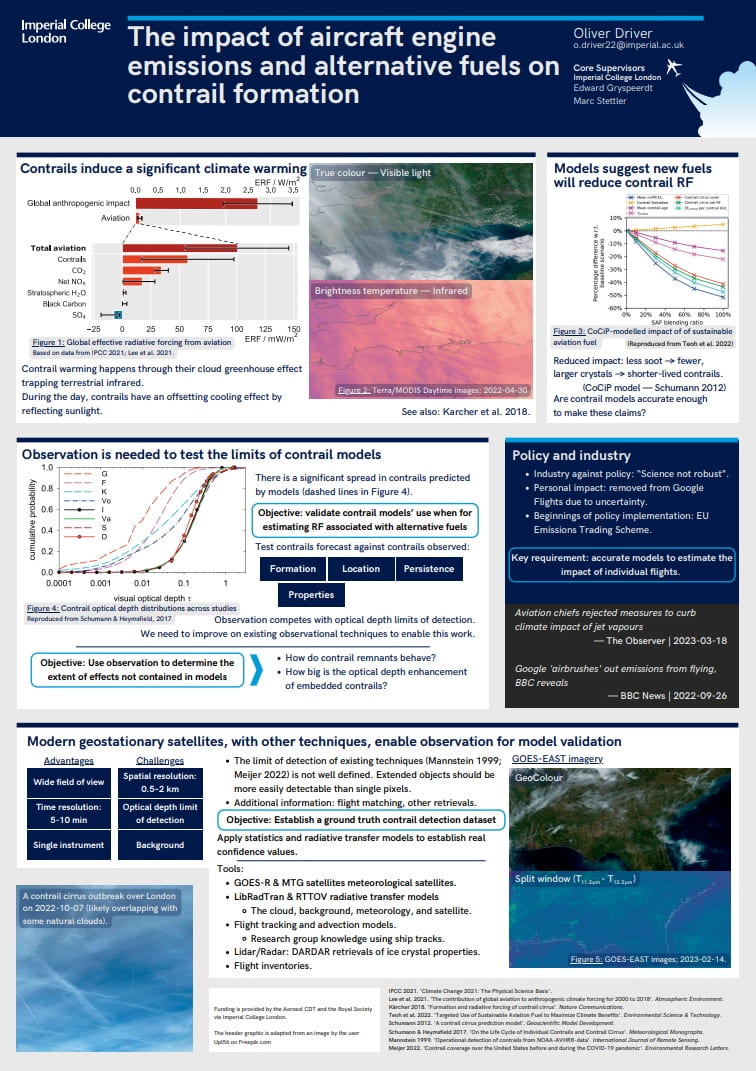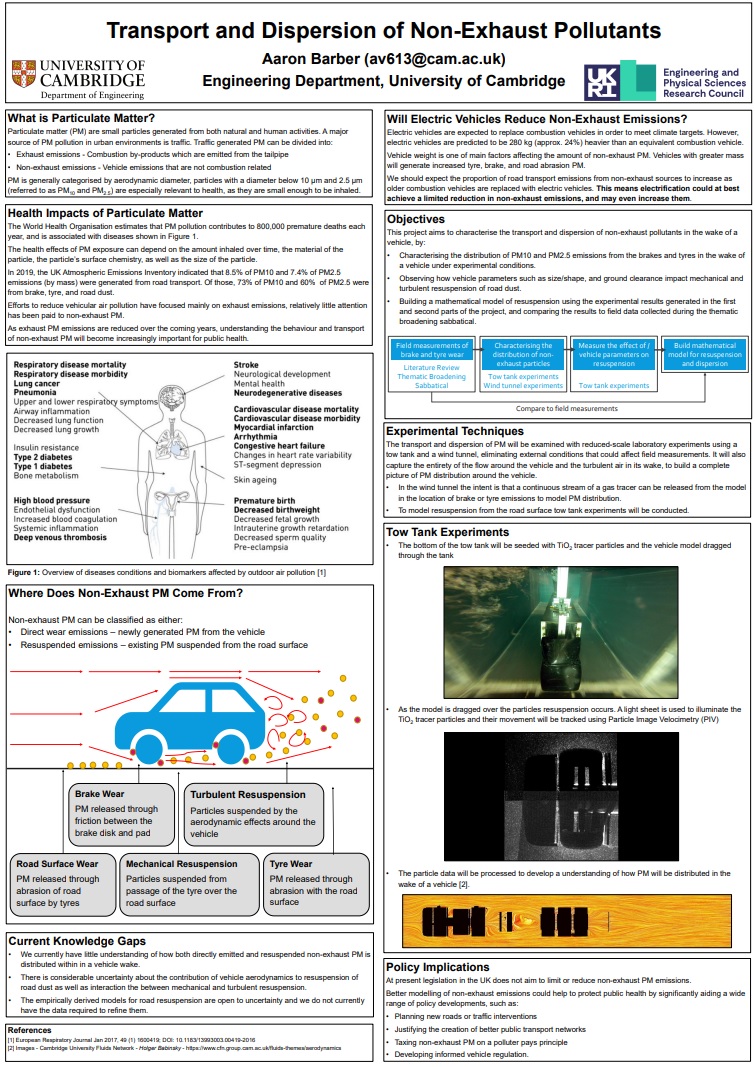Transport Emissions
Aerosol particles emitted from transport can impact on air quality, human health and global climate. CDT projects are exploring the non-exhaust emissions from road transport, including from tyre and brake abrasion, and how these particles can impact on health. Projects are also exploring the emissions from jet engines, both in the laboratory and in the environment, their role in contrail formation with the associated impacts on climate and their potential health impacts. The impact of volcanic particles on aircraft engines is also being explored.
Integrated modeling of aircraft contrails from plume to regional scale
This project seeks to improve our understanding of the climate effects of aviation beyond just the emitted carbon dioxide. Although several studies have indicated that aircraft condensation trails (contrails) forming on emitted particulates could cause climate impacts comparable to those from aviation carbon dioxide, uncertainty remains regarding the long-term effects of contrails. In this work, a new, open-source, multi-scale approach to contrail modelling will be developed which bridges the gap between existing plume-scale and global-scale models, constrained by satellite observations and high-fidelity modelling of early plume microphysics. This will then be used to produce a new understanding and quantification of the long-term impacts of contrails, including the role of cloud feedbacks.
PhD student: Jack Bartlett
Cohort: 6
Lead supervisors: Dr Sebastian Eastham, Dr Marc Stettler
Institution: Imperial College London
Bridging Across Scales for Contrail Impact Modelling
Half of aviation’s climate impact is due to the radiative forcing of contrails and contrail cirrus. Contrails are line-shaped ice clouds which form when water droplets present in the exhaust plumes of aircraft engines, freeze. This project aims to measure the process of condensation onto nanoparticles, to better understand the relationship between the activation of emissions and the characteristics of contrails formed. Data collected will be used to address the current limitations of contrail models, by providing information on a range of atmospherically relevant particles.
PhD student: Emily Winter
Cohort: 5
Lead supervisors: Dr Marc Stettler and Jey Williams (Airbus)
Institution: Imperial College London
This project is an industry funded studentship supported by Airbus
![]()
Nanoparticles from non-exhaust emissions: lung deposition and potential health impacts
With the ongoing transitions to hybrid and electric vehicles, tailpipe emissions will continue to fall but non-exhaust emissions are expected to rise. While a large body of research has been already done on the quantification of tailpipe emissions, their atmospheric fate, and their impact on public health, such information for non-exhaust emissions is currently scarce.
The aim of this PhD project is to fill the gap of knowledge on non-exhaust emissions, through an in-depth size and chemical characterisation and by assessing their intrinsic ability to cause lung inflammation and exacerbate diseases.
PhD student: Siriel Saladin
Cohort: 4
Lead supervisors: Dr Chiara Giorio
Institution: University of Cambridge
The impact of aircraft engine emissions and alternative fuels on contrail formation
Contrails are a large contributor to the climate impact of aircraft, new fuels have been proposed to reduce this impact, but their efficacy is currently unclear. This project will use satellite data to measure the development of contrails, developing accurate estimates of the impact of alternative fuels to meet climate targets.
PhD student: Oliver Driver
Cohort: 4
Lead supervisor: Dr Edward Gryspeerdt
Institution: Imperial College London
Transport and dispersion of non-exhaust pollutants
The most damaging form of pollution is particulate matter, which can be formed by brake wear, tyre wear and resuspension. This project will investigate the transport and dispersion of non-exhaust pollutants in the flow around a vehicle, with the aim of predicting the exposure of pedestrians and other road users.
PhD student: Aaron Varzdari Barber
Cohort: 3
Lead supervisor: Dr Megan Davies Wykes
Institution: University of Cambridge
This project is an industry funded studentship supported by The Centre for Sustainable Road Freight.
![]()
Microscale dynamics and light scattering characteristics of ice crystals in contrails
The climate impact of flying is dominated by the effect of contrails, white streaks you often see trailing behind an aircraft in the sky. This project will reduce uncertainty and fill gaps in our understanding of the aerosol processes that affect how contrails form, survive and contribute to climate change.
PhD student: Joel Ponsonby
Cohort: 3
Lead supervisor: Dr Marc Stettler
Institution: Imperial College London
Evaluation of the health impacts of aircraft nanoparticles using a surrogate soot source and in vitro cell exposure
Aircraft engines emit nanoparticles that may have specific health consequences due to their size and composition, especially near airports. This project will develop a laboratory source of surrogate aircraft soot particles that will be deposited on cell cultures to evaluate cellular responses and advance understanding of nanoparticle health impact pathways.
PhD student: Georgia Gamble
Cohort: 2
Lead supervisor: Dr Marc Stettler
Institution: Imperial College London
Particle Transport and Losses in Sampling Aircraft Gas Turbine Engine Combustion Emissions
Understanding soot formation and transport at the interface between engine exit and the combustor of a large gas turbine aircraft engine remains a significant challenge. This project will look to elucidate the problem, working closely with Rolls Royce, and will ultimately lead to a better understanding of the environmental impact of engines.
PhD student: Fergus Lidstone-Lane
Cohort: 2
Lead supervisor: Dr Paul I Williams
Institution: The University of Manchester
This project is an industry funded studentship supported by Rolls Royce.

Damage to jet engines by airborne particulates; Detection and mitigation
Mineral aerosols, such as volcanic ash and desert dust, present significant but uncertain risk to jet aircraft. To constrain this uncertainty the PhD researcher undertaking this project will design, build and test a jet engine simulator that will emulate engine conditions and will be field tested in a real world environment. The denouement of this project will be flying the simulator into desert storms and volcanic ash clouds on drones.
PhD student: Madeleine Reader
Cohort: 1
Supervisors: Dr Matthew Watson (Bristol) and Dr Paul Williams (Manchester)
Institution: University of Bristol

EPSRC CDT in Aerosol Science
University of Bristol
School of Chemistry
Cantock’s Close
Bristol, BS8 1TS
aerosol-science@bristol.ac.uk
Partner Newsletter
Sign up to receive monthly news and updates from the CDT in Aerosol Science, as well as events, training and research webinars.




